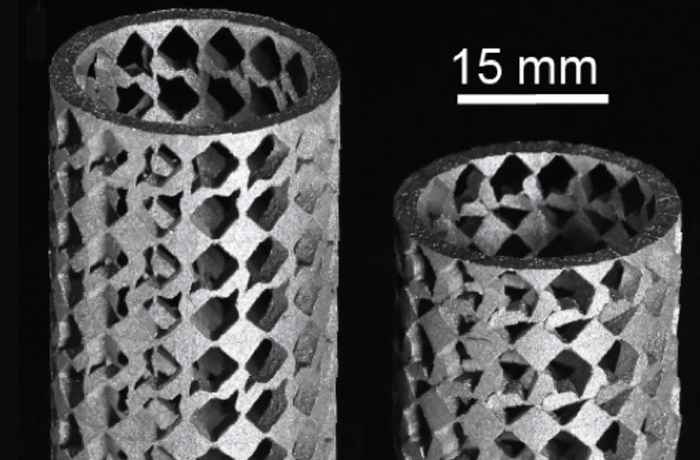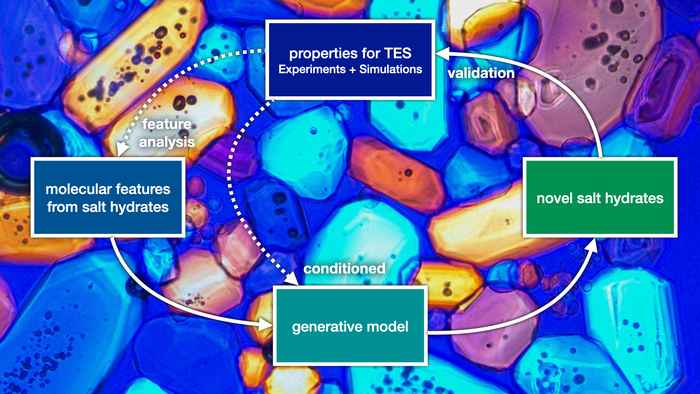Four projects kick-start the Artificial Intelligence for Sustainable Molecules and Materials research programme
Meet the researchers at the ChemAI event on 16 November
31 October 2023
Programme director Dr Bernd Ensing is very happy with the four challenging projects that the AI4SMM board selected for the programme, following a call for proposals in the Faculty. “All four fit well within the multidisciplinary AI4SMM aims and connect research groups in the different institutes of the Faculty. They are collaborative studies on topics such as developing metamaterials for sustainable steel, designing salt hydrates for energy storage, screening additives for sustainable plastics, and exploring plant protein mixtures for sustainable food design. With these exciting projects, we are off to a stellar start on our journey with the Research Priority Area.”
Join the ChemAI event
The four AI4SMM projects will run for two years, during which Ensing aims to expand the programme with external partners and additional funding. He invites anyone interested in meeting the AI4SMM researchers, and/or collaborating on the next phase of the programme, to attend the ChemAI-event on 16 November 2023. This will showcase successful examples of machine learning implementation, aims to accelerate the use of AI in the chemical and pharma industry, and offers opportunities to engage with representatives from academics and business.
Overview of granted AI4SMM projects
Metamaterials designed by AI for Sustainable Steel

Staff:
Corentin Coulais, Jan-Willem van de Meent
Institutes:
Institute of Physics, Institute of Informatics|
Project description:
Designing sustainable yet high-performance mechanical systems is extremely difficult because there are often conflicting requirements, e.g. making a lighter energy damper is hard because the energy absorbed by a material increases with its mass. An emerging opportunity is to use mechanical metamaterials to design components that meet specific criteria, such as yield strength and energy absorption, whilst minimizing the CO2 budget. In this project, we will develop deep learning methods to accelerate the computational design of dissipative metamaterials that will in turn enable new technology for sustainable steel. (Image taken from the research paper Leveraging yield buckling to achieve ideal shock absorbers)
Salt hydrates for thermal energy storage

Staff:
Noushine Shahidzadeh, Alberto Pérez de Alba, Sander Woutersen
Institutes:
Institute of Physics, Van ’t Hoff Institute for Molecular Sciences, Institute of Informatics
Project description:
To accelerate the energy transition towards sustainable sources, there is an urgency to develop novel technologies. Thermal Energy Storage (TES) materials are a technology that can contribute to a secure energy supply. We will investigate salt hydrates for which the reversible dehydration/hydration reactions can store/release heat. These have very high energy densities and are therefore promising candidates to reduce energy costs and peak power demand. We aim to increase efficiency, utilization, and lifetimes as well as to reduce capital costs. Delivering tunable and durable salt hydrates for TES could enable their widespread use in industry and society.
Deep representation & simplification of chemical additives for safe-and-sustainable-by-design plastics
Staff:
Saer Samanipour, Antonia Praetorius, Patrick Forré
Institutes:
Van ’t Hoff Institute for Molecular Sciences, Institute for Biodiversity and Ecology Dynamics, Institute of Informatics
Project description:
In this project we will apply a data-driven approach towards simplifying the suite of chemical additives used in plastics to support the development of Safe-and-Sustainable-by-Design (SSbD) polymeric materials. Currently, most plastics are neither circular nor sustainable, in large parts due to the wide range of different chemical additives—which impart specific functions on plastic materials—posing safety concerns and limiting effective recycling strategies. We will develop a Graph Neural Network (GNN) model to categorize chemicals additives into SSbD categories, based on their 3D molecular structure. The resulting short-list of safe chemical additives covering key functions is much needed for a transition towards the production of more sustainable plastics.
Machine Learning-based models of plant protein mixtures for sustainable food design
Staff:
Peter Bolhuis, Herke van Hoof, Sara Jabbari-Farouji, Francesca Quattrocchio, Peter Schall, Alberto Pérez de Alba Ortíz
Institutes:
Van ’t Hoff Institute for Molecular Sciences, Institute of Physics, Institute of Informatics, Swammerdam Institute for Life Sciences
Project description:
Our project aims to use machine learning to predict structure, aggregation and rheological behavior of naturally occurring complex protein mixtures in plants to design sustainable and healthy plant-based food products. Focusing on emerging plant proteins such as RuBisCo, pea, and potato proteins, that can serve as sustainable substitutes for animal proteins, we will develop a transferable colloidal model to predict aggregation, gelation and structural properties of complex mixtures and employ experimental data to train and validate the model. By leveraging this AI-driven model, we can accelerate a design pipeline for sustainable, plant waste-based, protein mixtures for food production.
